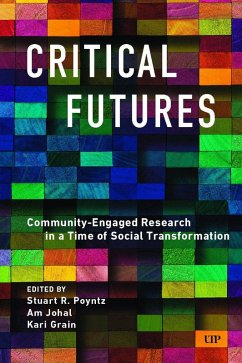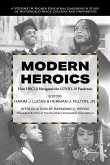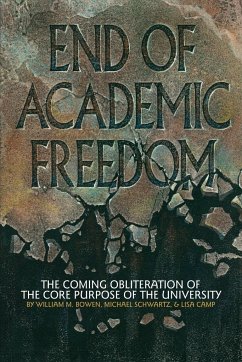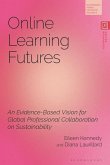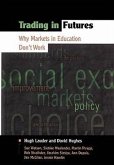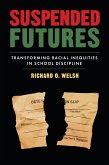Critical Futures
Community-Engaged Research in a Time of Crisis and Social Transformation
Herausgeber: Poyntz, Stuart; Johal, Am; Grain, Kari
Critical Futures
Community-Engaged Research in a Time of Crisis and Social Transformation
Herausgeber: Poyntz, Stuart; Johal, Am; Grain, Kari
- Broschiertes Buch
- Merkliste
- Auf die Merkliste
- Bewerten Bewerten
- Teilen
- Produkt teilen
- Produkterinnerung
- Produkterinnerung
Bringing together leading scholars, Critical Futures explores how community-engaged research can address social justice, decolonization, and transformation in response to contemporary crises.
Andere Kunden interessierten sich auch für
![Modern Heroics Modern Heroics]() Hakim J. LucasModern Heroics50,99 €
Hakim J. LucasModern Heroics50,99 €![End of Academic Freedom End of Academic Freedom]() William M BowenEnd of Academic Freedom50,99 €
William M BowenEnd of Academic Freedom50,99 €![Online Learning Futures Online Learning Futures]() Eileen KennedyOnline Learning Futures40,99 €
Eileen KennedyOnline Learning Futures40,99 €![Teachers' Pension Systems In The United States: A Critical And Descriptive Study Teachers' Pension Systems In The United States: A Critical And Descriptive Study]() Paul StudenskiTeachers' Pension Systems In The United States: A Critical And Descriptive Study25,99 €
Paul StudenskiTeachers' Pension Systems In The United States: A Critical And Descriptive Study25,99 €![Trading in Futures Trading in Futures]() David HughesTrading in Futures49,99 €
David HughesTrading in Futures49,99 €![A Historical and Critical Discussion of College Admission Requirements A Historical and Critical Discussion of College Admission Requirements]() Edwin Cornelius BroomeA Historical and Critical Discussion of College Admission Requirements18,99 €
Edwin Cornelius BroomeA Historical and Critical Discussion of College Admission Requirements18,99 €![Suspended Futures Suspended Futures]() Richard O WelshSuspended Futures32,99 €
Richard O WelshSuspended Futures32,99 €-
-
-
Bringing together leading scholars, Critical Futures explores how community-engaged research can address social justice, decolonization, and transformation in response to contemporary crises.
Produktdetails
- Produktdetails
- Verlag: University of Toronto Press
- Seitenzahl: 384
- Erscheinungstermin: 16. Dezember 2025
- Englisch
- Abmessung: 229mm x 152mm x 25mm
- ISBN-13: 9781487550202
- ISBN-10: 1487550200
- Artikelnr.: 73112658
- Herstellerkennzeichnung
- Libri GmbH
- Europaallee 1
- 36244 Bad Hersfeld
- gpsr@libri.de
- Verlag: University of Toronto Press
- Seitenzahl: 384
- Erscheinungstermin: 16. Dezember 2025
- Englisch
- Abmessung: 229mm x 152mm x 25mm
- ISBN-13: 9781487550202
- ISBN-10: 1487550200
- Artikelnr.: 73112658
- Herstellerkennzeichnung
- Libri GmbH
- Europaallee 1
- 36244 Bad Hersfeld
- gpsr@libri.de
Stuart R. Poyntz is a professor and associate director of the School of Communication and a director of the Community-Engaged Research Centre Initiative at Simon Fraser University. Kari Grain is a lecturer in the Faculty of Education and coordinator of the master of education program in Adult Learning and Global Change (ALGC) at the University of British Columbia; she also serves as a research associate for the Community-Engaged Research Initiative at Simon Fraser University. Am Johal is the director of the Vancity Office of Community Engagement and co-director of the Community-Engaged Research Initiative at Simon Fraser University.
Foreword
Timothy K. Eatman
Introduction: Crisis and Social Transformation in Community-Engaged
Research
Stuart R. Poyntz, Am Johal, and Kari Grain
Part 1: Transformations, Complexities, and Critical Conversations
Introduction: Reimagining Community-Engaged Research
1. Pushing Against, Reaching Towards: Commitments, Contingencies, and
Contestations in Community-Engaged Research and Practice
Rubén Gaztambide-Fernández and Sarah Switzer
2. Community-Engaged Research and the “Right to be Rural”
Sean Markey, S. Ashleigh Weeden, Ryan Gibson, Greg Halseth, and Laura Ryser
3. Money, Power, and Reciprocity: Financial Transactions and Critical
Reciprocity in Community-Engaged Research
Vanessa Fong, Kari Grain, Stuart R. Poyntz, and Amanda Wager
4. How Community-Engaged Research and Learning Became “Work-Integrated
Learning” (WIL): The Shifting Discourses of Canadian Experiential Learning
David Peacock
5. Relational Soil Care: A Community-Engaged Response to Global Soil Crisis
Katherine Lawless, David Janzen, and Ed Gregorich
6. The Ethics of Care in a Pandemic: Weaving Together Anti-Racist Practice
and Disability Justice in our Community-Engaged Work
Ciann Wilson and Natalie Kivell
7. Your $20 Starbucks Gift Card Isn’t Helping: A Conversation about
Community-Based Research as a Cooperative Undertaking
Adam Gaudry and Matt Hern
Part 2: Decolonization and Indigenization
Introduction: Decolonization and Decolonizing Practices in CER
8. Community-Engaged Research for Self-Determination: Decolonial Urban
Strategies
Lyana Patrick
9. Relational Accountability and Reconcilia(c)tion in Two-Spirit Research
and Education
Harlan Pruden and Travis Salway
10. The Elephant in the Room: Tokenism, Currency, and Dispossession in
Community-Engaged Research
Jessica Hallenbeck and Rosemary Georgeson
11. “The Circle”: Circular and Relational Research in Response to
Complexity and Crisis
Sharon Karsten
12. Decolonizing Community-Based Research: A Four Quadrants Approach to
Understanding the Impacts of COVID-19 on Elders and Seniors
Crystal Tremblay, Tanya Clarmont, Lisa Mercure, Emily Dzyngel, and Katie
Dzyngel
Part 3: Case Studies and Field Perspectives
Introduction: Case Studies from the Field
13. Changing the System: Steps Towards Empowering Community Governance of
Research Ethics in the Downtown Eastside of Vancouver
Scott D. Neufeld, Jules Chapman, Nicholas D. Leech (Crier), Samona Marsh,
and Jim McLeod
14. Art at Work and Workers as Artists: Project Thinking, Craft, and
Creativity in Community-Engaged Research
Will Garrett-Petts and Evelyn Asiedu
15. Exploring Transformative Reciprocity in Community-Engaged Learning
Rhianna Nagel, Alexandra Haupt, Kathy Sanford, Lilaine Galway, and Lisa
Mort-Putland
16. Learning in Public: Towards Critically Hopeful Practices in a CER
Support Unit
Elizabeth Jackson
17. Seizing the Moment: Community-Campus Conversations to Support
Communities Through and Beyond the Pandemic
Lynn Gidluck, Amber J. Fletcher, and Magda Goemans
18. Using Dialogic Methods and Tools to Identify Accessible Collaboration
Pathways between Communities and Campuses: A Case Study with Ashoka Fellows
and Changemaker Campuses
Charmaine Lyn, Nicole Norris, and Jennifer DeCoste
Conclusion: The Future of Community-Engaged Research
Stuart R. Poyntz, Kari Grain, and Am Johal
Contributors
Index
Timothy K. Eatman
Introduction: Crisis and Social Transformation in Community-Engaged
Research
Stuart R. Poyntz, Am Johal, and Kari Grain
Part 1: Transformations, Complexities, and Critical Conversations
Introduction: Reimagining Community-Engaged Research
1. Pushing Against, Reaching Towards: Commitments, Contingencies, and
Contestations in Community-Engaged Research and Practice
Rubén Gaztambide-Fernández and Sarah Switzer
2. Community-Engaged Research and the “Right to be Rural”
Sean Markey, S. Ashleigh Weeden, Ryan Gibson, Greg Halseth, and Laura Ryser
3. Money, Power, and Reciprocity: Financial Transactions and Critical
Reciprocity in Community-Engaged Research
Vanessa Fong, Kari Grain, Stuart R. Poyntz, and Amanda Wager
4. How Community-Engaged Research and Learning Became “Work-Integrated
Learning” (WIL): The Shifting Discourses of Canadian Experiential Learning
David Peacock
5. Relational Soil Care: A Community-Engaged Response to Global Soil Crisis
Katherine Lawless, David Janzen, and Ed Gregorich
6. The Ethics of Care in a Pandemic: Weaving Together Anti-Racist Practice
and Disability Justice in our Community-Engaged Work
Ciann Wilson and Natalie Kivell
7. Your $20 Starbucks Gift Card Isn’t Helping: A Conversation about
Community-Based Research as a Cooperative Undertaking
Adam Gaudry and Matt Hern
Part 2: Decolonization and Indigenization
Introduction: Decolonization and Decolonizing Practices in CER
8. Community-Engaged Research for Self-Determination: Decolonial Urban
Strategies
Lyana Patrick
9. Relational Accountability and Reconcilia(c)tion in Two-Spirit Research
and Education
Harlan Pruden and Travis Salway
10. The Elephant in the Room: Tokenism, Currency, and Dispossession in
Community-Engaged Research
Jessica Hallenbeck and Rosemary Georgeson
11. “The Circle”: Circular and Relational Research in Response to
Complexity and Crisis
Sharon Karsten
12. Decolonizing Community-Based Research: A Four Quadrants Approach to
Understanding the Impacts of COVID-19 on Elders and Seniors
Crystal Tremblay, Tanya Clarmont, Lisa Mercure, Emily Dzyngel, and Katie
Dzyngel
Part 3: Case Studies and Field Perspectives
Introduction: Case Studies from the Field
13. Changing the System: Steps Towards Empowering Community Governance of
Research Ethics in the Downtown Eastside of Vancouver
Scott D. Neufeld, Jules Chapman, Nicholas D. Leech (Crier), Samona Marsh,
and Jim McLeod
14. Art at Work and Workers as Artists: Project Thinking, Craft, and
Creativity in Community-Engaged Research
Will Garrett-Petts and Evelyn Asiedu
15. Exploring Transformative Reciprocity in Community-Engaged Learning
Rhianna Nagel, Alexandra Haupt, Kathy Sanford, Lilaine Galway, and Lisa
Mort-Putland
16. Learning in Public: Towards Critically Hopeful Practices in a CER
Support Unit
Elizabeth Jackson
17. Seizing the Moment: Community-Campus Conversations to Support
Communities Through and Beyond the Pandemic
Lynn Gidluck, Amber J. Fletcher, and Magda Goemans
18. Using Dialogic Methods and Tools to Identify Accessible Collaboration
Pathways between Communities and Campuses: A Case Study with Ashoka Fellows
and Changemaker Campuses
Charmaine Lyn, Nicole Norris, and Jennifer DeCoste
Conclusion: The Future of Community-Engaged Research
Stuart R. Poyntz, Kari Grain, and Am Johal
Contributors
Index
Foreword
Timothy K. Eatman
Introduction: Crisis and Social Transformation in Community-Engaged
Research
Stuart R. Poyntz, Am Johal, and Kari Grain
Part 1: Transformations, Complexities, and Critical Conversations
Introduction: Reimagining Community-Engaged Research
1. Pushing Against, Reaching Towards: Commitments, Contingencies, and
Contestations in Community-Engaged Research and Practice
Rubén Gaztambide-Fernández and Sarah Switzer
2. Community-Engaged Research and the “Right to be Rural”
Sean Markey, S. Ashleigh Weeden, Ryan Gibson, Greg Halseth, and Laura Ryser
3. Money, Power, and Reciprocity: Financial Transactions and Critical
Reciprocity in Community-Engaged Research
Vanessa Fong, Kari Grain, Stuart R. Poyntz, and Amanda Wager
4. How Community-Engaged Research and Learning Became “Work-Integrated
Learning” (WIL): The Shifting Discourses of Canadian Experiential Learning
David Peacock
5. Relational Soil Care: A Community-Engaged Response to Global Soil Crisis
Katherine Lawless, David Janzen, and Ed Gregorich
6. The Ethics of Care in a Pandemic: Weaving Together Anti-Racist Practice
and Disability Justice in our Community-Engaged Work
Ciann Wilson and Natalie Kivell
7. Your $20 Starbucks Gift Card Isn’t Helping: A Conversation about
Community-Based Research as a Cooperative Undertaking
Adam Gaudry and Matt Hern
Part 2: Decolonization and Indigenization
Introduction: Decolonization and Decolonizing Practices in CER
8. Community-Engaged Research for Self-Determination: Decolonial Urban
Strategies
Lyana Patrick
9. Relational Accountability and Reconcilia(c)tion in Two-Spirit Research
and Education
Harlan Pruden and Travis Salway
10. The Elephant in the Room: Tokenism, Currency, and Dispossession in
Community-Engaged Research
Jessica Hallenbeck and Rosemary Georgeson
11. “The Circle”: Circular and Relational Research in Response to
Complexity and Crisis
Sharon Karsten
12. Decolonizing Community-Based Research: A Four Quadrants Approach to
Understanding the Impacts of COVID-19 on Elders and Seniors
Crystal Tremblay, Tanya Clarmont, Lisa Mercure, Emily Dzyngel, and Katie
Dzyngel
Part 3: Case Studies and Field Perspectives
Introduction: Case Studies from the Field
13. Changing the System: Steps Towards Empowering Community Governance of
Research Ethics in the Downtown Eastside of Vancouver
Scott D. Neufeld, Jules Chapman, Nicholas D. Leech (Crier), Samona Marsh,
and Jim McLeod
14. Art at Work and Workers as Artists: Project Thinking, Craft, and
Creativity in Community-Engaged Research
Will Garrett-Petts and Evelyn Asiedu
15. Exploring Transformative Reciprocity in Community-Engaged Learning
Rhianna Nagel, Alexandra Haupt, Kathy Sanford, Lilaine Galway, and Lisa
Mort-Putland
16. Learning in Public: Towards Critically Hopeful Practices in a CER
Support Unit
Elizabeth Jackson
17. Seizing the Moment: Community-Campus Conversations to Support
Communities Through and Beyond the Pandemic
Lynn Gidluck, Amber J. Fletcher, and Magda Goemans
18. Using Dialogic Methods and Tools to Identify Accessible Collaboration
Pathways between Communities and Campuses: A Case Study with Ashoka Fellows
and Changemaker Campuses
Charmaine Lyn, Nicole Norris, and Jennifer DeCoste
Conclusion: The Future of Community-Engaged Research
Stuart R. Poyntz, Kari Grain, and Am Johal
Contributors
Index
Timothy K. Eatman
Introduction: Crisis and Social Transformation in Community-Engaged
Research
Stuart R. Poyntz, Am Johal, and Kari Grain
Part 1: Transformations, Complexities, and Critical Conversations
Introduction: Reimagining Community-Engaged Research
1. Pushing Against, Reaching Towards: Commitments, Contingencies, and
Contestations in Community-Engaged Research and Practice
Rubén Gaztambide-Fernández and Sarah Switzer
2. Community-Engaged Research and the “Right to be Rural”
Sean Markey, S. Ashleigh Weeden, Ryan Gibson, Greg Halseth, and Laura Ryser
3. Money, Power, and Reciprocity: Financial Transactions and Critical
Reciprocity in Community-Engaged Research
Vanessa Fong, Kari Grain, Stuart R. Poyntz, and Amanda Wager
4. How Community-Engaged Research and Learning Became “Work-Integrated
Learning” (WIL): The Shifting Discourses of Canadian Experiential Learning
David Peacock
5. Relational Soil Care: A Community-Engaged Response to Global Soil Crisis
Katherine Lawless, David Janzen, and Ed Gregorich
6. The Ethics of Care in a Pandemic: Weaving Together Anti-Racist Practice
and Disability Justice in our Community-Engaged Work
Ciann Wilson and Natalie Kivell
7. Your $20 Starbucks Gift Card Isn’t Helping: A Conversation about
Community-Based Research as a Cooperative Undertaking
Adam Gaudry and Matt Hern
Part 2: Decolonization and Indigenization
Introduction: Decolonization and Decolonizing Practices in CER
8. Community-Engaged Research for Self-Determination: Decolonial Urban
Strategies
Lyana Patrick
9. Relational Accountability and Reconcilia(c)tion in Two-Spirit Research
and Education
Harlan Pruden and Travis Salway
10. The Elephant in the Room: Tokenism, Currency, and Dispossession in
Community-Engaged Research
Jessica Hallenbeck and Rosemary Georgeson
11. “The Circle”: Circular and Relational Research in Response to
Complexity and Crisis
Sharon Karsten
12. Decolonizing Community-Based Research: A Four Quadrants Approach to
Understanding the Impacts of COVID-19 on Elders and Seniors
Crystal Tremblay, Tanya Clarmont, Lisa Mercure, Emily Dzyngel, and Katie
Dzyngel
Part 3: Case Studies and Field Perspectives
Introduction: Case Studies from the Field
13. Changing the System: Steps Towards Empowering Community Governance of
Research Ethics in the Downtown Eastside of Vancouver
Scott D. Neufeld, Jules Chapman, Nicholas D. Leech (Crier), Samona Marsh,
and Jim McLeod
14. Art at Work and Workers as Artists: Project Thinking, Craft, and
Creativity in Community-Engaged Research
Will Garrett-Petts and Evelyn Asiedu
15. Exploring Transformative Reciprocity in Community-Engaged Learning
Rhianna Nagel, Alexandra Haupt, Kathy Sanford, Lilaine Galway, and Lisa
Mort-Putland
16. Learning in Public: Towards Critically Hopeful Practices in a CER
Support Unit
Elizabeth Jackson
17. Seizing the Moment: Community-Campus Conversations to Support
Communities Through and Beyond the Pandemic
Lynn Gidluck, Amber J. Fletcher, and Magda Goemans
18. Using Dialogic Methods and Tools to Identify Accessible Collaboration
Pathways between Communities and Campuses: A Case Study with Ashoka Fellows
and Changemaker Campuses
Charmaine Lyn, Nicole Norris, and Jennifer DeCoste
Conclusion: The Future of Community-Engaged Research
Stuart R. Poyntz, Kari Grain, and Am Johal
Contributors
Index

